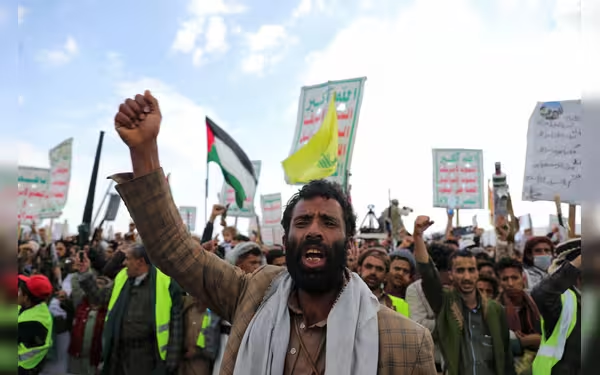Saturday, November 16, 2024 05:39 PM
US and Britain Intensify Raids on Houthi Targets in Yemen
- US and Britain launch airstrikes in Yemen.
- Houthi rebels accused of maritime attacks.
- Escalating conflict disrupts global trade routes.
 Image Credits: arabnewspk
Image Credits: arabnewspkUS and Britain escalate military operations in Yemen targeting Houthi rebels amid ongoing maritime threats.
In recent developments, the United States and Britain have intensified their military operations in Yemen, specifically targeting the Iran-backed Houthi rebels. This escalation comes as a response to ongoing threats posed by the Houthis, who have been accused of attacking shipping vessels in crucial maritime routes such as the Red Sea and the Gulf of Aden. The Pentagon confirmed that US warplanes conducted multiple strikes on Saturday night, focusing on advanced weapons storage facilities used by the Houthis.
According to the Pentagon, these facilities were crucial for the Houthis, as they contained various weapons aimed at military and civilian vessels navigating international waters. The Houthi-run Al Masirah television network reported that the strikes specifically targeted the southern Al Sabeen district of the Yemeni capital, Sanaa. Eyewitnesses described the scene, stating, "They heard intense flying, along with explosions in different parts of the capital Sanaa." This indicates the severity of the situation and the impact of the airstrikes on the local population.
The ongoing conflict in Yemen has seen the United States and Britain conducting repeated strikes against Houthi targets since January. This military action is largely in response to the rebels' attacks on shipping in the Red Sea and Gulf of Aden, which are vital routes for global trade. The Houthis, on the other hand, claim that their attacks are aimed at vessels linked to Israel, asserting that these actions are a form of solidarity with Palestinians amid the ongoing Gaza war.
The situation has led to significant disruptions in maritime traffic, affecting approximately 12 percent of global trade that passes through the Red Sea. Over the past year, the Houthis have launched more than 100 attacks, resulting in the deaths of four sailors and the sinking of two ships. Additionally, one vessel and its crew have been held captive since being hijacked last November, highlighting the ongoing risks in these waters.
Interestingly, the recent airstrikes occurred just three days after Houthi leader Abdul Malik Al-Houthi criticized US President-elect Donald Trump for his support of Israel. Al-Houthi argued that normalization deals between Arab countries and Israel, facilitated by Trump, have failed to resolve the Middle East conflict, suggesting that such efforts would likely fail again in Trump's second term.
As the situation in Yemen continues to evolve, it raises important questions about the future of international relations in the region and the ongoing humanitarian crisis. The conflict has not only affected military and political dynamics but has also had devastating consequences for the Yemeni people, who are caught in the crossfire. Understanding the complexities of this situation is crucial for anyone interested in global affairs, as it underscores the interconnectedness of international politics and the impact of military actions on civilian lives.













